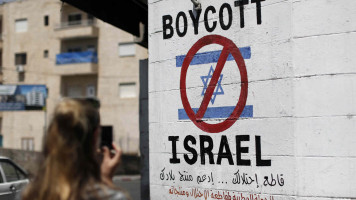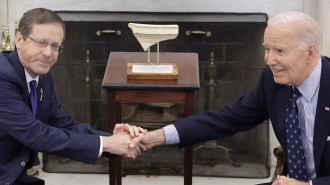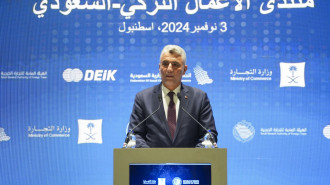Twin suicide bombings rock central Baghdad
Twin suicide bombings ripped through a busy market in the Iraqi capital Thursday, killing at least 32 people and wounding 110 others, officials said.
The rare suicide bombing attack hit the Bab Al-Sharqi commercial area in central Baghdad amid heightened political tensions over planned early elections and a severe economic crisis. Blood smeared the floors of the busy market amid piles of clothes and shoes as survivors took stock of the disarray in the aftermath.
No one immediately took responsibility for the attack.
Iraq's military said at least 32 people were killed and 110 wounded in the attack and said some of the injured were in serious condition. Hospital and police officials said the death toll was actually much higher, with at least 32 dead and more than 110 wounded. They spoke on condition of anonymity because they were not authorised to brief the media.
Iraq’s Health Ministry announced all of its hospitals in the capital were mobilised to treat the wounded.
The attack occurred as security forces pursued two suicide bombers who detonated their explosives in the market near Tayaran Square, according to military spokesman Yahya Rasool.
The suicide bombings marked the first in three years to target Baghdad's bustling commercial area. A suicide bomb attack took place in the same area in 2018 shortly after then-Prime Minister Haidar Al-Abadi declared victory over the Islamic State group.
|
|
No one immediately took responsibility for Thursday's attack, but Iraq has seen assaults perpetrated by both the Islamic State group and militia groups in recent months.
Militias have routinely targeted the American presence in Iraq with rocket and mortar attacks, especially the US Embassy in Baghdad's heavily fortified Green Zone. The pace of those attacks, however, has decreased since an informal truce was declared by Iran-backed armed groups in October.
An expert on Iraqi security affairs, Ahmed Al-Nuaimi believes the new bombings to be evidence that an active terrorist cell has managed to infiltrate the capital, under the nose of the Baghdad Operations Command.
Nuaimi added to The New Arab's sister Arabic publication Al-Araby Al-Jadeed that the attacks raise fears that a new page of terrorist violence, which could lead to and benefit the sectarian rhetoric adopted by militias and parties, aiding them in the upcoming elections.
The attack was similar to those IS has conducted in the past. But the group has rarely been able to penetrate the capital since being dislodged by Iraqi forces and the US-led coalition in 2017.
Read more: Moqtada al-Sadr makes a gamble for power as protesters killed
The twin bombings Thursday came days after Iraq's government unanimously agreed to hold early elections in October. Prime Minister Mustafa Al-Kadhimi had announced in July that early polls would be held to meet the demands of anti-government protesters.
Demonstrators took to the streets in the tens of thousands last year to demand political change, and an end to rampant corruption and poor services. More than 500 people were killed in mass demonstrations as security forces used live rounds and tear gas to disperse crowds.
Iraq is also grappling with a severe economic crisis brought on by low oil prices that has led the government to borrow internally and risk depleting its foreign currency reserves. The Central Bank of Iraq devalued Iraq's dinar by nearly 20% last year to meet spending obligations.
Follow us on Facebook, Twitter and Instagram to stay connected
Note: This story has been edited to reflect the rise in the reported deathtoll.
![Iraq market bombing [Getty] Iraq market bombing [Getty]](/sites/default/files/styles/large_16_9/public/media/images/B71E7497-4F25-4D37-ADA9-E7449443587F.jpg?h=d1cb525d&itok=Usg5oHAQ)






 Follow the Middle East's top stories in English at The New Arab on Google News
Follow the Middle East's top stories in English at The New Arab on Google News


